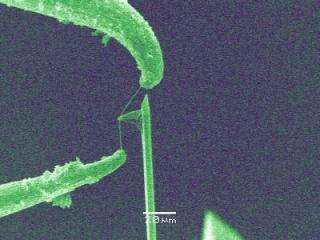Circa 2006 o.,o.
Researchers at the National Institute of Standards and Technology and the University of Colorado at Boulder have designed a carbon nanotube knife that, in theory, would work like a tight-wire cheese slicer.
In a paper presented this month at the 2006 International Mechanical Engineering Congress and Exposition, the research team announced a prototype nanoknife that could, in the future, become a tabletop tool of biology, allowing scientists to cut and study cells more precisely than they can today.
For years, biologists have wrestled with conventional diamond or glass knives, which cut frozen cell samples at a large angle, forcing the samples to bend and sometimes later crack. Because carbon nanotubes are extremely strong and slender in diameter, they make ideal materials for thinly cutting precise slivers of cells. In particular, scientists might use the nanoknife to make 3D images of cells and tissues for electron tomography, which requires samples less than 300 nanometers thick.
